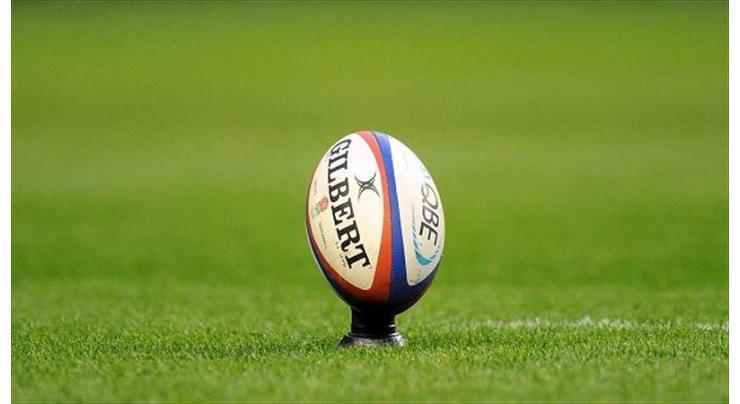
Rugby Must Lay Down Law Or Lose Players: Head Injury Foundation
Zeeshan Mehtab Published October 20, 2021 | 04:26 PM

Rugby authorities need to implement enforceable laws to reduce head impact exposure or risk "players dropping out of the game at all levels", the head of an influential head injury foundation has told AFP
Paris, (APP - UrduPoint / Pakistan Point News - 20th Oct, 2021 ) :Rugby authorities need to implement enforceable laws to reduce head impact exposure or risk "players dropping out of the game at all levels", the head of an influential head injury foundation has told AFP.
Concussion in rugby and the fallout for players later in life have become high-octane topics.
Former players including England's 2003 World Cup winning hooker Steve Thompson filed a lawsuit last year against World Rugby, the Rugby Football Union (RFU) and Wales Rugby Union (WRU) for negligence in protecting them from the risks of concussion.
World Rugby issued a set of recommendations in September that limit full contact training to 15 minutes a week and set a 40-minute weekly limit for controlled contact training.
The Drake Foundation's CEO Lauren Pulling said while the new limits were encouraging, there was a strong likelihood that they would not be widely implemented.
She said in football some coaches had already admitted they were not implementing limits brought in to restrict high-impact headers in training.
"Given this may well be the case in rugby too, we want to see enforceable laws imposed to reduce head impacts," Pulling said.
The Drake Foundation is a not-for-profit organisation committed to improving the health and welfare of people impacted by head injuries through scientific research.
Pulling was speaking ahead of the release of a study funded by her foundation and carried out the London school of Hygiene and Tropical Medicine, Queen Mary University of London and the Institute of Occupational Medicine and published in Alzheimer's and Dementia: The Journal of the Alzheimer's Association.
A positive finding in the study, called BRAIN, is that it finds no difference in cognitive function before the age of 75 between players in the pre-professional era (those who turned professional in 1995) with three or more concussions, and those with fewer.
The study team worked with 146 former elite rugby players in England aged 50 and over.
However, the results, coupled with a Drake study of current elite players and recent cases of brain disease in retired professional players, suggests the sport may have become more damaging to brain health since it turned professional.
"We don't have comparable data from the modern game so we do not have the full picture,"said Pulling.
"But we do know that in the modern game players are generally bigger, stronger and faster so there is more force on the brain in head impacts."
Recent Stories

Selection committee dissolved over Pakistan women cricket team's poor performanc ..

Punjab CM Maryam Nawaz in police uniform at Chung police center

Currency Rate In Pakistan - Dollar, Euro, Pound, Riyal Rates On 25 April 2024

Today Gold Rate in Pakistan 25 April 2024

Mired in crisis, Boeing reports another loss

Session Awarding Ceremony 2024 held at Cadet College Muzaffarabad

Austrian ski great Hirscher to make comeback under Dutch flag

Pakistan, Japan agrees to convene 'Economic Policy Dialogue'

FM Dar conveys deepest sympathy on torrential rains devastation in UAE

Spain PM Sanchez says weighing resignation after wife's graft probe

Tennis: ATP/WTA Madrid Open results - 1st update

Long-lost Klimt portrait auctioned off for 30 mn euros
More Stories From Sports
-

Selection committee dissolved over Pakistan women cricket team's poor performance
14 minutes ago -
Paris holds its breath for Olympic swimming events in murky Seine
2 hours ago -

Austrian ski great Hirscher to make comeback under Dutch flag
12 hours ago -

Tennis: ATP/WTA Madrid Open results - 1st update
12 hours ago -

Osaka seals first win on clay since 2022 in Madrid
12 hours ago -

Watford hire Cleverley as permanent boss
13 hours ago
-

Karachi, Lahore, Multan win matches of National Women’s Cricket Tournament
13 hours ago -

No communication gap among players, asserts Babar Azam
13 hours ago -

Bracewell looks ahead to Champions Trophy 2025 in Pakistan
13 hours ago -

Bolt named ICC Men’s T20 WC 2024 ambassador
14 hours ago -

Kewell's Yokohama beat Ulsan to reach Asian Champions League final
15 hours ago -

Tennis: ATP/WTA Madrid Open results
16 hours ago










